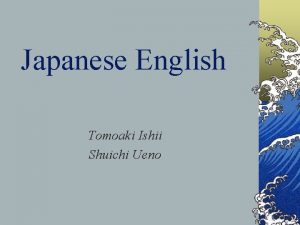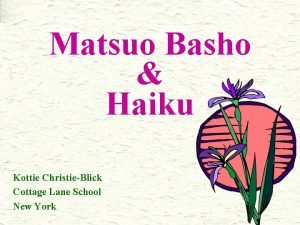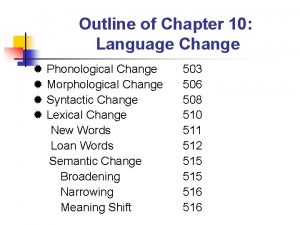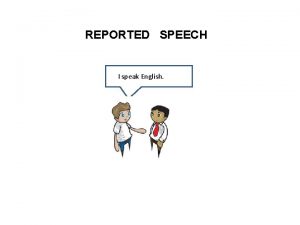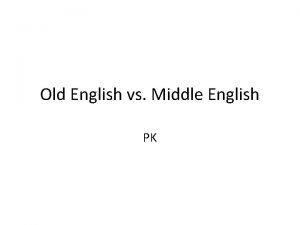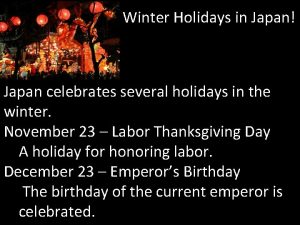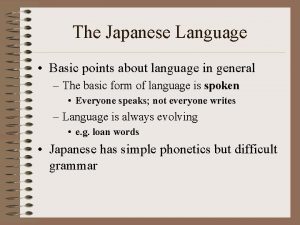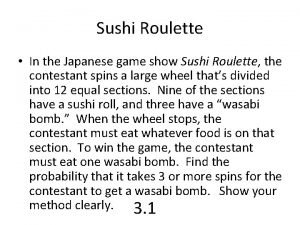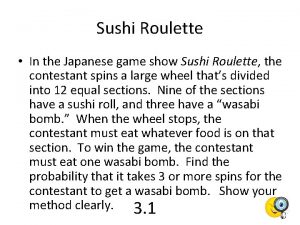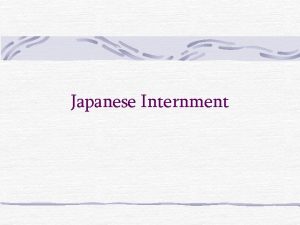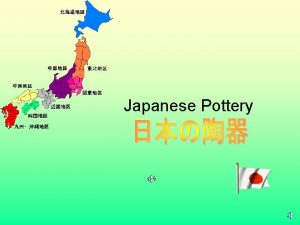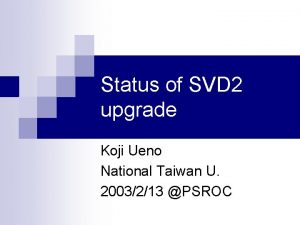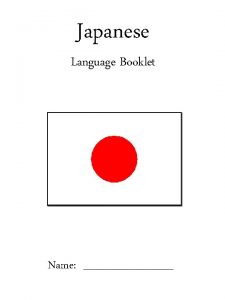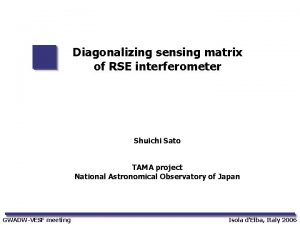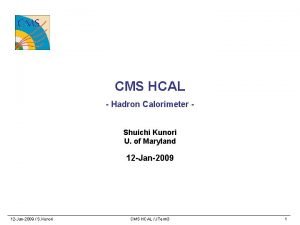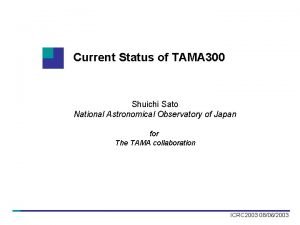Japanese English Tomoaki Ishii Shuichi Ueno Loanwords Definition





























- Slides: 29

Japanese English Tomoaki Ishii Shuichi Ueno

Loanwords ©Definition - words borrowed from another language ex. karate, karaoke etc. - loanwords also carry culture ex. karaoke - Higher standard Lower standard

Loanwords in Japanese - There are many loanwords from American culture. ex. radio, cake, stake etc - When did they come? 1. After the Meiji Restoration in 1867 2. After WWII

Pronunciation of Japanese ©Japanese words are easy to pronounce ©A word is composed of one or more than one syllable. ©A syllable is chiefly composed of either (a) a single vowel or (b) a combination of a consonant and a vowel.

Pronunciation of Japanese ©There are five vowels. They are always pronounced in the same way: “a” as in aloha “i” as in ink “u” as in full “e” as in bell “o”as in oil

Japanese English ©How were they made? ©Because of pronunciation ©Roman letters = COOL!!

Japanese English © 3 types of Japanese English - change of pronunciation ex. Makudonarudo = Mc. Donald’s biiru =beer rosanzerusu = Los Angeles

Japanese English - clipped words ex. Pasocon = personal computer rimocon = remote controller basuke = basketball

Japanese English - English words coined in Japan ex. four ball =walk cooler =air conditioner cider =pop

Question What is “dead ball”?

Answer “Hit by a pitch”

Question 2 What is “open game”?

Answer 2 “Exhibition game”

Question 3 what is “nighter”?

Answer 3 “night game”

Question 4 What is “handle”?

Answer 4 “steering wheel”

Question 5 what is “punk”?

Answer 5 “flat tire”

Question 6 What is “blind touch”?

Answer 6 “touch typing”

As a result… ©We have something strange in public

Mistakes of Japanese English in Public Proudly selling pumpkin by-product since 1996!

Mistakes of Japanese English in Public For people who like aggressive food

Mistakes of Japanese English in Public So do I go forward then?

Mistakes of Japanese English in Public Well if you're going to be coming, you might as well do it in lemon.

Mistakes of Japanese English in Public "Calpis" - a kind of soft drink, and I don't want to know the ingredients.

Conclusion ©They make misunderstanding.

Japanese people have to use correct
 Undetermined in tagalog
Undetermined in tagalog Japanische hochzeit in deutschland
Japanische hochzeit in deutschland Sfumato pronunciation
Sfumato pronunciation Hagpat in tagalog
Hagpat in tagalog A cottage in the lane poem
A cottage in the lane poem Notan in japanese
Notan in japanese English speak lesson
English speak lesson Spoken english and broken english g.b. shaw summary
Spoken english and broken english g.b. shaw summary Tumoxan
Tumoxan The father of english tragedy
The father of english tragedy Old english vs modern english
Old english vs modern english British and american word differences
British and american word differences Difference between american english and british english
Difference between american english and british english Old english vs modern english
Old english vs modern english “i speak english” he said that he ……english
“i speak english” he said that he ……english Olde english examples
Olde english examples The gap between written and spoken english
The gap between written and spoken english Types of english
Types of english Japanese winter holidays
Japanese winter holidays A style of japanese film and television animation
A style of japanese film and television animation Visualizing japanese grammar
Visualizing japanese grammar Which is the japanese word means harbour waves
Which is the japanese word means harbour waves Diet pyramid
Diet pyramid Language japanese
Language japanese The japanese have always loved
The japanese have always loved Japanese tanka poems
Japanese tanka poems Ta form japanese
Ta form japanese In the japanese game show sushi roulette
In the japanese game show sushi roulette In the japanese game show sushi roulette
In the japanese game show sushi roulette Human academy japanese language school
Human academy japanese language school


